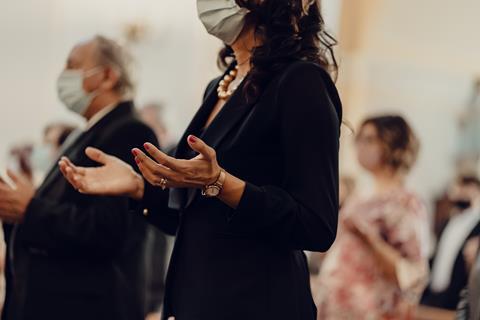Now ‘Freedom Day’ has arrived in England, the government says masks only need to be worn in crowded public places - but should that include churches? Graham Nicholls argues not, and that Christians need to be wary of turning mask wearing into a legalistic, loveless debate

Perhaps we should get “What Would Jesus Do?” facemasks printed.
Last week, Tim Farron passionately argued the case for continuing to wear masks after 19 July, even though he does not specify precisely when and where. He rightly points to the need for Christians to think of the wider community rather than their own individual freedom. He reminds us that Jesus did not stand on his own rights when he gave himself as a sacrifice for us all.
So is that the end of the matter? Should we all just wear a mask whenever in a public place, because in doing so, we are demonstrating sacrificial love? Because it’s what Jesus would do?
But is it really that simple? And what about in Church?
This is a topic on which many, like Tim, feel strongly. As such, the personal opinions that I express here are made with some hesitancy, recognising my own limited understanding of the science and also my personality bias towards more, rather than less, risk.
A personal decision
That said, I would argue that mask wearing should be a personal decision now that it is no longer mandated by law. A mask may help prevent the transmission of Covid-19, and yes, we must consider how best to love others. But, in general, I do not think it wise for churches to impose mask wearing on their congregations.
Can churches really be compared to crowded tube trains, pubs and night clubs?
Some church leaders might judge that, in all good conscience, the risks posed by the removal of masks is too great. I am personally not convinced this is the right decision.
I am all in favour of wearing a mask when asked to do so by a shopkeeper, a bus driver, a church leader, a friend or family member (unless I have a very good reason not to).
But I am not sure it is right for Christians to turn mask wearing into a moral duty - a fulfilment of the law of love. I believe this binds the conscience of another believer and removes personal responsibility. The degree of protection offered by a typical loose-fitting mask is open to question anyway, and by demonising those who do not view them as essential seems to insist this judgment is better than theirs. Is that loving?
A hindrance to worship
When it comes to church gatherings, we know that wearing masks is a hindrance to our worship – to seeing and communicating with each other, and to singing praises to the Lord and to one another. The government has clearly decided that, for England, the benefits of wearing a mask are no longer sufficient to make it a legal requirement. Therefore, we should need a compelling reason to impose this in our churches – and I am not sure there is one.
In the press briefings ahead of July 19, the government has expressed an “expectation” that masks will continue to be worn in “enclosed, crowded places like public transport, where you come into contact with people you don’t normally meet”. Can churches really be compared to crowded tube trains, pubs and night clubs?
Although infection rates are rising, the risk of a highly infectious person attending church is only moderate, given how aware and responsible Christians have been throughout the pandemic. Anyone with symptoms will surely stay away.
Furthermore, a large proportion of congregations are now vaccinated. Along with continuing hygiene protocols, ventilation and some degree of social distancing, the possibility of spreading an infection is low. And even if someone does catch Covid-19, case fatality rates are now comparable to that of flu.
A strong line
If we decide that the wearing of masks should continue, we take upon ourselves the responsibility for judging when the mass of indicators and statistics will be sufficiently positive to decide otherwise – something we are frankly unqualified to do.
This could mean that nothing will change for many months, possibly even through to next spring.
Tim Farron rightly cautions against this debate becoming so bitter that it reflects the culture wars going on in wider society. But I fear that if we take a strong line on keeping masks, rather than expressing love for others, we take sides in what is a political and cultural debate and may become legalistic, judgmental and more driven by fear than love.Now ‘Freedom Day’ has arrived in England.





































